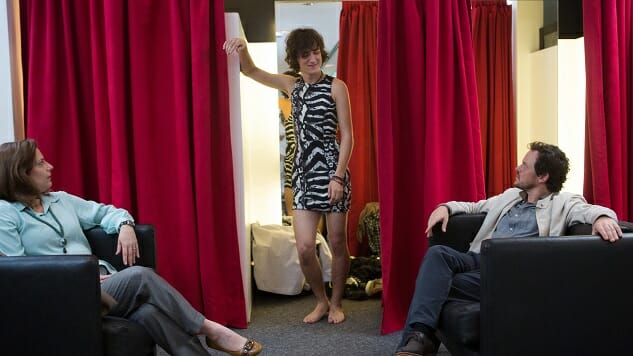Don’t Call Me Son

Anna Muylaert’s new film, Don’t Call Me Son, is a story of both gender and sexual confusion, but Muylaert’s protagonist isn’t the one who’s confused. Pierre (Naomi Nero) likes boys as much as he likes girls, and he’s as comfortable wearing high heels and a zebra print dress as he is wearing skinny jeans, a polo shirt and a blazer. The trouble is that his biological parents aren’t comfortable with any of that, and also that they’ve just met Pierre after searching for him since he was snatched away from them by Aracy (Daniela Nefussi) in his infancy. Maybe Mom and Dad are just stuffy and uptight. Maybe they’re too attached to their heteronormative values. Maybe they’re just terrible, horrible, no good, very bad people.
Or maybe meeting your androgynous, model-handsome, crossdressing son for the first time in near-on 20 years just comes as a shock when you’ve spent the duration painting a picture of who he is and what he’s like in your head. Muylaert doesn’t judge, at least not much, though it’s hard not to peg Pierre’s father Matheus (Matheus Nachtergaele) as the villain of the piece: He goes from zero to enraged in a second when first introduced to Pierre’s proclivity for women’s clothing. Blind fury isn’t a good look on anybody (especially compared to that zebra print dress, which fits Nero like a glove), but Don’t Call Me Son neither lectures from atop a soapbox nor caterwauls from the pulpit. The film is too grounded for that, too charitable, too invested in panoramic understanding.
In other words, yes, Matheus sucks, but the situation he finds himself in with Pierre sucks, too. For its first ten minutes, Don’t Call Me Son suggests loose, free-form, rhythm-of-life filmmaking, setting itself up as the tale of Pierre’s coming of age while living with his single mother and his sister, Cristina: Pierre goes to parties wearing pantyhose and has sex on top of bathroom sinks, he practices with his band, he takes photos of his bare ass with his phone and he shaves his chest when no one’s looking. The film lacks structure, until that opening sequence passes and suddenly Pierre is hustled off to a police station, Aracy is in handcuffs and we’re sitting down for an awkward family reunion with Pierre’s birth family.
Don’t Call Me Son moves quickly because it has to. The film clocks in at about half the total running time of Muylaert’s last movie, The Second Mother, which was also focused on definitions of family. But that movie had space to stretch out its legs—by contrast, Don’t Call Me Son is downright compressed, though Muylaert uses each second with economical precision, folding meaning upon meaning into each scene without conflating or muting any of her themes or intentions. Her movie is about how we define ourselves by the people surrounding us, and what happens when they disappear or are taken away. Maybe a longer version of the movie would talk aloud about Pierre’s sexual orientation or gender identity, but that movie might not as effectively speak to either through text as it does through subtext.